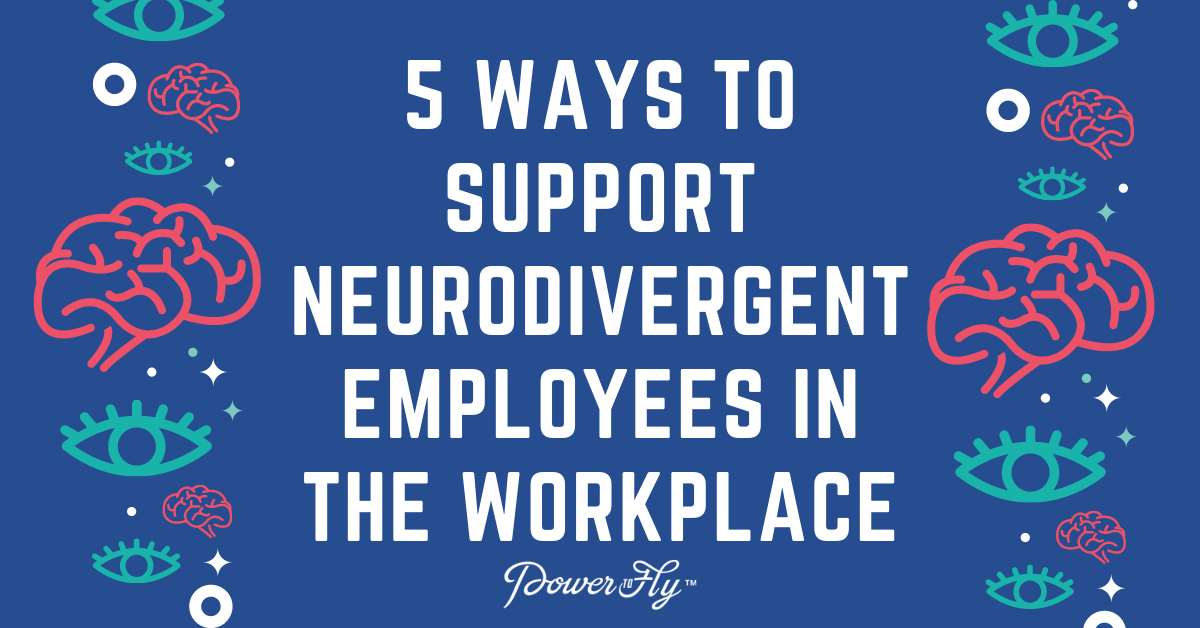Being unique in the professional realm is a game-changer.
Different ways of thinking can lead to new innovations and competitive advantages for businesses. With fresh eyes, sharp minds, and unique abilities, that’s just one of the benefits neurodivergent employees can offer! That’s why making sure your neurodivergent employees are supported is an important investment for the future of business.
In April, we celebrate neurodiversity through Autism Awareness Month. And while it’s an important time to appreciate the many talents and unique perspectives that this community brings to the workplace, it’s a celebration that should continue year-round.
Perhaps that’s why many have stopped calling it Autism Awareness Month and started using Autism Acceptance Month— because it’s time to move past being aware and start accepting and celebrating the different ways that people think!
Whether you’re an employer or a coworker, you can help cultivate a safe environment for unique perspectives, creativity, and talent! Here is a list of 5 ways that you can do just that by supporting neurodivergent employees in the workplace.
1. Discuss individual needs and accommodations
Neurodiversity is an umbrella term that covers autism spectrum disorder, dyslexia, ADHD, dyspraxia, and learning disabilities. This means no two neurodivergent people are the same and each one will have their own specific needs to be met in the workplace to ensure success.
The best way to make sure that each individual is successfully accommodated is to discuss it with them personally. Allow them to tell you what accommodations could be made so they can be as productive and comfortable as possible. Then work with them to develop solutions for any problems and cultivate an environment that will best fit their needs.
For example, if an individual struggles with sensory sensitivity, they may require a quiet space to work, a fragrance-free environment, or maybe specific lighting fixtures. Or perhaps you’re working with a dyslexic individual. They might benefit from either virtual or in-person meetings rather than email or written forms of conversing.
Whatever it may be, open communication is key to a safe and successful workplace atmosphere!
2. Give clear communication, instructions, and expectations
Avoid being ambiguous in your communication with neurodivergent workers. Whether you’re a manager or a coworker, it’s always important to be as clear as you can in whatever form your communication takes.
Some neurodivergent individuals may struggle to grasp nuances or inferred meanings unlike neurotypical thinkers, so it’s crucial to be explicit about job expectations, priorities, and available support.
It is also important to remember to be as specific as possible when giving instructions. The National Autistic Society offers a great example: “...rather than saying 'Give everybody a copy of this', say 'Make three photocopies of this, and give one each to Sam, Mary and Ahmed'.” This avoids accidental misinterpretations that can lead to frustration and confusion for some neurodivergent workers.
It is also important to cater to individual communication requirements. For instance, an autistic staff member may benefit from written instructions that they can refer back to at any time, but a dyslexic staff member may prefer verbal communication to avoid any confusion.
3. Make work schedules are structured and flexible
Structure is important, and even more so for neurodivergent people. Structured schedules for neurodivergent employees help to ensure them certainty, success, and less frustration in the workplace.
Always be willing to help prioritize daily, weekly, and monthly tasks, and offer precise start times and deadlines for those that may need them. Some employees with autism spectrum disorder may also benefit from breaking these bigger tasks into smaller, more manageable steps.
It may also be necessary to help those on the autism spectrum with adjusting to a routine, as well as preparing them in advance for any upcoming changes that could affect their schedule.
But while some neurodivergent individuals benefit from a strict daily routine, others, especially those with ADHD, may benefit from a schedule that allows for flexible days and hours as well as regular breaks. This allows them to be able to perform their best without the stress of breaking a rigid schedule.
4. Offer support and resources
A healthy, inclusive atmosphere for neurodivergent individuals begins with education in the workplace. Educating neurotypical employees on neurodiversity and the benefits and unique ways of thinking they can bring to the professional realm can help cultivate an environment that is both aware and appreciative of the importance of being different.
Educated staff can better collaborate with their neurodivergent coworkers and accommodate their needs by knowing how they can help their colleagues succeed on a daily basis. Educated managers are more apt to communicate, offer support, and listen to new ideas offered by their neurodivergent team members.
It is also important to offer resources to the neurodiverse staff. Whether it’s a mentor, manager, or another form of one-on-one assistance, having someone to support them in times of stress, answer questions, or help with making accommodations can make a huge impact on creating a healthy, inclusive workplace.
5. Use positive and inclusive language
It’s important that both employers and coworkers show their respect and appreciation for neurodivergent team members in their communication.
Officially, businesses can show their inclusivity through professional communication. This includes a business' mission statement, vision and values, job descriptions, HR policies, and so on. While these directly affect employees internally, it also has an external effect by spreading awareness and normalizing neurodiverse inclusivity in the professional realm.
Coworkers can also play a big role in inclusivity through communication. Supporting, encouraging, and accommodating neurodivergent colleagues when possible helps them feel like a valued community member. Whether it’s emails, meetings, or daily conversations with colleagues, using positive and inclusive language can help cultivate a safe environment for neurodivergent coworkers.
Want to learn more about how to support neurodivergent employees? Check out this free guide!




